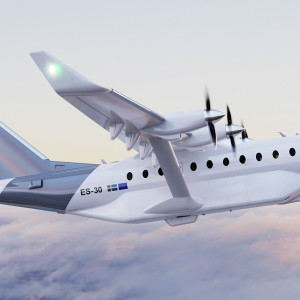Confirmed – electric aviation takes off in Europe and could revolutionize commercial flights sooner than you think


The aviation industry is going greener! We are familiar with innovations coming from the automotive industry like electric vehicles[1], and aviation is also trying to develop technology capable of functioning without fossil fuels that increase the climate change situation. In Sweden, electric aviation is closer to being a reality because this is the place where the first models of electric engines for aircrafts are being developed, in commercial flights for the moment.
There's also other technologies being developed, like the biofuels made from microalgae and the use of hydrogen, to reduce emissions. Of course this project has challenges, but it's the beginning of a new era for the aviation industry. So, let's see what's coming up for commercial flights!
Electric engines in the aviation industry
In the last years, we have witnessed an energy transition in the automotive industry putting their faith in electric vehicles.
It's true most of the cars we see on the road use gasoline or diesel, but electric models are being manufactured by many companies and others are thinking about stopping to manufacture combustion engine cars in the next couple of decades. But, what's happening in the aviation industry? Implementing electric engines in aircrafts is very different and more complex than cars.
The reason is because the batteries needed to move an aircraft are too heavy using current technology, so for big planes, like commercial flights, it wouldn't be possible to even lift off.
Electric aircrafts already exist
Currently, the limited number of electric aircrafts are prototypes or small planes - two seater planes. However, there are plans to keep developing more projects like these in the aviation industry. Let's take the example of Sweden where researchers are working on manufacturing the first electric plane with a capacity of 30 passengers, which is expected to be ready to function by 2030.
It seems very far, but the truth is it's a huge step in the aviation industry and the introduction of sustainable technology.
Swedish projects
As we mentioned, Sweden is one of the countries starting to develop electric planes. Researchers are working on different projects related to this issue and one of the key places for them is the Save airport in Gothenburg, where it is being prepared to receive hybrid electric planes - combining electric engines and other types of energy. The Swedish company Heart Aerospace[2] is developing an electric engine plane with current technology capable of flying up to 32 km.
Although this data is very limited for commercial flights, the company is working on increasing the distance in the next few years. What's more, Gotland (Sweden) is also introducing itself into these technological advances for the aviation industry, because this place allows flying tests with electric planes. This is so positive for researchers, entrepreneurs and technology companies putting their faith in this transformation.
Challenges
According to Christoffer Lewandowski, from Heart Aerospace, one of the main challenges in this process is making necessary regulations and adapting airports' infrastructure.
Now, planes will need installations to be charged once they land and this is not very common to see in airports. In addition, there must be new certification processes for these types of aircrafts which takes a lot of time.
Other alternatives
Electricity is the most promising way to produce energy used by companies and their transports, but there are other options that could reduce emissions of aviation like:
- Hydrogen: there are some projects which have already used hydrogen as the source of clean energy for planes.
- Biofuels: these are made from organic materials. One of the most important projects using this is in Germany, where researchers are working on a fuel made from microalgae capable of reducing aviation emissions up to 90%.
At first, we might see these electric planes as a very strange option, but it will end up being normal as it happened with electric cars.
Everything that contributes in a positive way to the environment is well received, don't you think so?
References
- ^ innovations coming from the automotive industry like electric vehicles (unionrayo.com)
- ^ Heart Aerospace (heartaerospace.com)